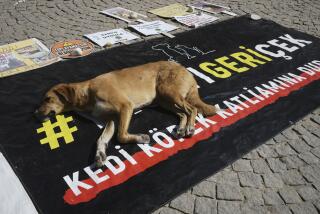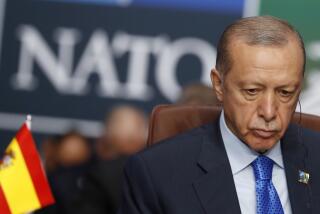National Agenda : Desire for More Trade Has Turkey Wrangling : To achieve customs union with Europe, the country is wrestling with reform. Initial changes may not be enough.
- Share via
ISTANBUL, Turkey — Somehow treaties with the European Union seem to prompt defining moments for a country. The Turks have not escaped as they agonize over the trappings of a free trade pact with the 15-nation EU, confronting once again the hard choices of their 200-year-old race to catch up with the West.
The options are perennial: continued stagnant tradition or upsetting reforms, authoritarian order or human rights. Some observers believe the choice is between Turkey’s Islamic, Middle Eastern origins and its ambition to be accepted as part of Europe.
The latest focus of this tug of war is the package of Turkish democratic reforms tangled up with the country’s planned customs union with Europe. Without Turkey making clear its intent to liberalize, particularly in regard to freedom of expression for ethnic Kurds, the European Parliament may not endorse the deal before its agreed start in January.
It took the Turkish Parliament six weeks to agree to even mild reforms of the repressive 1982 constitution. On Sunday, it voted in 16 amendments that allow unions and professional associations back into politics, lower the voting age to 18 and remove special articles praising Turkey’s last military coup, in 1980.
“Let’s be happy, but let’s not exaggerate,” wrote Rauf Tamer in the newspaper Hurriyet after the 450-seat Parliament at last set aside its bickering and voted a resounding 360-32 for the package. “It’s good news for the future, but it took a 40-day marathon to get to this point, and it looks like we just did it to look sweet for Europe.”
All commentators noted that the reforms are limited. The negotiating powers of civil service unions were left for a future law. Corrupt actions and laws made by officers under Turkey’s former military regime may still not be challenged in court. And the much-criticized Article 8 of the anti-terrorism law, under which more than 150 people are in jail for expressing their opinions, mostly about Turkey’s 12 million ethnic Kurds, will now not be discussed again until Parliament reconvenes in October.
*
Strangely, the debate has not been directly about whether a free trade pact with Europe is good for Turkey. Polls say about two-thirds of Turkey’s 65 million people approve, attracted by the idea of lower-priced imports and a firm anchor with the economic bloc with which Turkey does half its trade.
After years of foot-dragging, many Turkish institutions have come on board. The country’s most progressive newspaper has adopted “On to Europe” as its masthead motto. Business associations have become supportive, despite probable short-term losses. The Foreign Ministry has stated categorically its intention to achieve membership in the customs union by Jan. 1. . Even the bickering Parliament has managed to do its bit on difficult technical issues.
The charge d’affaires representing the European Commission in Turkey, Jorg Ketelsen, said an assessment this month by the EU found that progress had been made on harmonization of laws on intellectual property rights, competition, consumer protection and standards.
“The Turkey-EU Assn. Council meets on Oct. 30. . . . We are rather confident that it will not propose a postponement of the customs union. Turkey is well within the time limits for the end of the year,” Ketelsen said.
That should be good news for Turkey’s North Atlantic Treaty Organization allies, such as the United States, whose diplomats are heavily backing the customs union. France has emerged as Turkey’s main friend in Europe.
“We must not discourage Turkey’s aspiration to be associated with Europe,” French President Jacques Chirac said earlier this month. “If we reject this appeal, we run a double risk: reinforcing the supporters of fundamentalism in Turkey, and driving this big neighbor, if it is disappointed by Europe, toward other forms of cooperation that we may later regret.”
Chirac was addressing the European Parliament, which, flexing the new muscles given to it by the 1991 Maastricht Treaty, has insisted on a say about political aspects of a deal that will bring Turkey closer to the 15 than any other non-member of the Brussels-based European Union.
The European Parliament has a problem with Turkey’s human rights record. Several resolutions over the past year have called for political and judicial reforms.
The assembly has particularly protested the jailing of a number of ethnic Kurds who were thrown out of Parliament last year and convicted of collaborating with Kurdish rebels. Six remain in jail, although Turkey’s courts have left open the option of an appeal in September. *
To make matters worse, a right-wing Turkish Cabinet minister called “whores” three powerful women leaders of the European Parliament who came to Turkey to learn more about the country. He offered a weak apology, but nevertheless kept his post.
Such Turkish conservatives are receiving support from an ad hoc alliance of right-wingers favoring authoritarian rule, such as some generals in the powerful Turkish army, or others who simply dislike Prime Minister Tansu Ciller, such as President Suleyman Demirel or the main center-right opposition leader, Mesut Yilmaz.
Conservatives also believe European lawmakers should be more understanding about the threat Turkey faces from the rebel Kurdistan Workers Party, or PKK. The Turks point to the number of civilians killed by the rebels in the 11-year-old insurgency. European governments agree with the United States that the PKK is a terrorist group, but European opinion concentrates on summary executions, disappearances and about 2,000 southeastern Kurdish villages forcibly evacuated by the security forces.
The clock meanwhile ticks on. The European Parliament must either endorse customs union with Turkey by December or let the matter drift into a gray legal area, which would require a new generation of negotiations and decisions.
The debate has strengthened the power of Ciller, Turkey’s first woman prime minister, as the standard-bearer of Turkish reform. But it has also shown the secretive and better-organized strength of the pro-Islamist Welfare Party.
Benefiting from petty bickering among the pro-European majority of deputies, the Islamists played a key role in blocking progress on reforms in Parliament.
“The country has won, and the Welfare Party has lost,” Ciller gloated after the reforms finally went through. But that may not be the end of the story. Polls show that the Islamists will be strong contenders in the next elections, due to be called before fall 1996.
(BEGIN TEXT OF INFOBOX / INFOGRAPHIC)
At the Crossroads
Turkey is a bridge between Europe, the Mideast and Russia. Most Turks want close ties with Europe and its economy.
More to Read
Sign up for Essential California
The most important California stories and recommendations in your inbox every morning.
You may occasionally receive promotional content from the Los Angeles Times.













